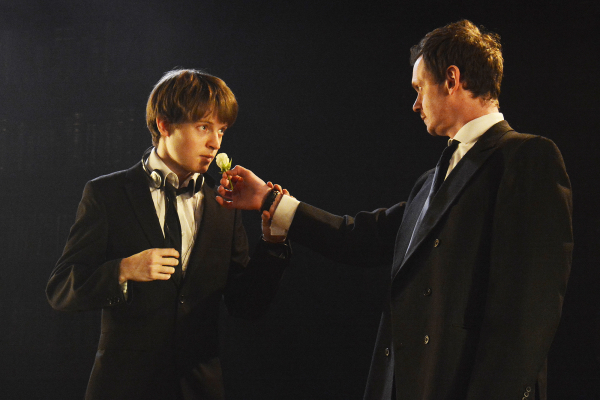A Breakfast of Eels (Print Room)

© Nobby Clark
Robert Holman is a one-off. His plays don’t tackle their subjects, so much as invite them in and put them up for an evening. In fact, they don’t really have subjects at all – certainly not in any singular sense. Instead, they’re infused with ideas, rather like a good broth is full of flavours. Holman’s plays ponder. They never pontificate.
A Breakfast of Eels is right up there with his best. Two men, brothers in all but blood, are dealing with the death of the man both call ‘daddy.’ Holman lets them sit with and share in their grief, so that, mostly, they just talk, swapping secrets and memories, fears and advice in various spots: a library, a cemetery, up North and down South.
Penrose, the younger by 14 years, has been left a large Highgate House and a significant sum of money. He wants to share it. Francis, taken in by the family as a teenager, has been left nothing. He refuses the offer.
If A Breakfast of Eels is an inheritance drama, it’s not the usual ‘bickering over booty’ sort. It’s far more metaphorical than that: about inheriting the world – and responsibility for it. Francis stands, swamped, in his father’s suit or buries himself in his books. Penrose, meanwhile, is a sensitive, young soul, incapable of imposing himself on the world.
At one point, the two of them stand on Parliament Hill and look out over London, as if surveying their kingdom. Just as they are custodians for their crumbling family home and its contents, London (and, by extension, the world) is theirs to look after now. It’s theirs to shape anew.
Holman’s question is how. Francis (Andrew Sheridan), raised in a children’s home in Northumbria, after incurring abuse and losing his sister, is guarded, unsentimental and protective. Penrose (Matthew Tennyson), a young man cushioned through life, is all trust. He shares everything – as digital natives do – and once held a funeral for a wasp. Holman clearly cares dearly for both men, but they need each other and, in a way, the world needs them both. Amongst other things, this is a play about inequality; one that finds as many answers in privilege as in poverty.
It’s also a study of brotherhood – as profound as I’ve encountered. Holman turns in a full-bodied philosophical treatise; on elder brothers as antecedents and younger brothers as surrogate children; on friendship’s ebb and flow against permanent family ties and the way a shared childhood is inescapable. Brothers can’t fool one another. They know each other completely.
Both parts were written, tailor-made, for their actors and it totally shows. Sheridan and Tennyson have an uncanny similiarity – one a weathered, older version of the other – and a gorgeous, easy chemistry. Robert Hastie‘s exquisite production – unhurried and precise, credible and poetic – along with Nicholas Holdridge’s textured lighting lets you luxuriate in the piece, so that Holman’s words and images – so rich and singular, so ripe with metaphor – can truly soak in. Profound and humane, this is a play that puts life on pause. When it restarts, we might live it better.
A Breakfast of Eels runs at the Print Room until 11th April. Click here for more information and to book tickets.










